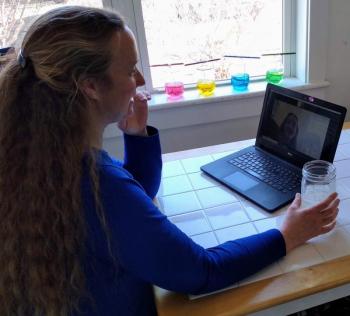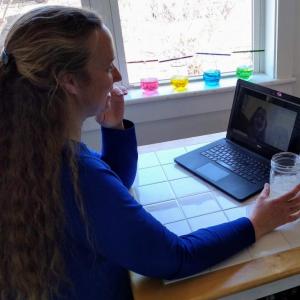Doulas adjust to new way of helping expectant parents during COVID-19 days
Every profession across the nation has been impacted, in some way, by the ongoing COVID-19 pandemic, including the doula industry.
A doula, according to DONA International, is a trained professional providing physical, emotional and informational support to a mother before, during and shortly after childbirth to achieve the healthiest, most satisfying experience possible.
Doulas, traditionally, meet with families in-person. During the pandemic, however, they have shifted to offering virtual services, which yields advantages and disadvantages for themselves and their clients.
“For many expecting families, their birth plans have been thrown a huge curve ball with this pandemic,” said Caitlin Kilpatrick, owner of Belfast’s Childbirth Edification.
Childbirth classes have been canceled, or at least no longer held in-person, and parents are left guessing how long it will be until their loved ones will be able to physically meet their newborns. Partners, Kilpatrick noted, are, at times, forced to use FaceTime for ultrasound appointments and prenatal checkups due to social distancing guidelines.
“That's a lot to deal with on top of all the normal stresses that accompany pregnancy,” Kilpatrick said. “But women are incredibly strong and resilient, and I've spoken with several expecting families who are taking it all in stride.”
During these days, it is more important than ever, according to Kilpatrick, for parents to receive support from doulas, even if the support is virtually.
Leah Kohlstrom, owner of Birthing Mothers in Camden, also emphasized the importance of support amid these unusual times.
“As a doula my job is to physically and emotionally support while educating families before, during, and after childbirth,” Kohlstrom said. “Prenatally, I teach about the process of childbirth and those first weeks postpartum, talk through fears and anxieties, and bring to light each person's unique coping skills as well as helping empower couples to be informed consumers. Once they are in labor, I arrive at their chosen place of birth and support, educate, comfort, normalize, and hold space for the birth process. In the days and weeks after the baby has arrived, I spend multiple hours in my client's home helping them adjust to live with a new baby. Social distancing has made my job far more complicated.”
Shifting to virtual sessions have proved vital for the area’s doulas to best serve their clients.
“Describing labor positions or comfort measures is possible with the written or spoken word but is infinitely easier if I can simply model for my clients what I am teaching them,” said Kohlstrom. “Using virtual sessions, I am able to meet families from my living room to theirs to explain the process of labor and birth and answer any real time questions they have. It is much easier for me to demonstrate the ‘double hip-squeeze’ or a particular massage technique than to simply describe it.”
Kilpatrick, meanwhile, noted extraordinary times call for creativity, namely, when it comes to encouraging, equipping and supporting her clients.
“As a childbirth educator and labor doula, it's very important to me that I can continue to support pregnant women and families through this time when so much has changed for them already,” said Kilpatrick.
Despite the nontraditional method of holding childbirth education sessions virtually, slight advantages of implementing virtual sessions have been discovered.
“I think the biggest advantage of shifting to virtual sessions is that families can still get the education and support that they desire without potentially putting themselves or others at risk,” said Kilpatrick. “Peace of mind is worth a lot. We talk a lot in childbirth classes about how fear can negatively impact labor. If hosting virtual classes or supporting clients virtually puts their minds more at ease about potential exposure, then it's worth it.”
“Because Maine is such a dispersed state and I work with clients within a 75 mile radius, the virtual format has meant far less driving and has allowed a much greater level of flexibility,” said Kohlstrom. “It allows couples to both participate if they are temporarily in different locations due to work, school, or military responsibilities.”
In fact, Kilpatrick noted virtual childbirth classes may entice couples, perhaps less inclined to attend in-person sessions, to seek their desired services.
The pandemic has, however, spurred disadvantages, particularly as hospitals limited the number of people present in the delivery room.
“The biggest disadvantage to shifting to virtual sessions is that I can't offer hands-on physical support,” Kilpatrick said. “I quickly discovered that talking a partner through particular massage techniques or labor positions without being able to demonstrate in-person can be a bit tricky and humorous for everyone involved.”
“Though I have attended [more than] 75 births, have been a doula for 13 years, and have consistently [built] positive working relationships with the local hospital staff, I am still considered simply a visitor and, under the one support person only policy, am not allowed to attend the births of my clients,” Kohlstrom said.
Kohlstrom’s presence in the delivery room is considered key for some of her clients.
“Part of my job is ‘reading the room,’ gathering the cold cloth for Mom's face while Dad is rubbing her back, refreshing the ice water while partners slow dance together, and giving couples the tools they need to make truly informed decisions in the moment,” Kohlstrom said. “Some off these are physically impossible to do and others are infinitely more complicated over FaceTime, Zoom [or] Google Hangouts.”
Despite the desire to be in the delivery room, Kohlstrom is understanding of the newly enacted policies.
“Having worked in most of the labor and delivery units in the Midcoast with a myriad of OBs, CNMs and nurses as well as with many CPMs at home-births, I am aware of the incredibly challenging job before them right now,” Kohlstrom noted. “The work of balancing the unknown risks with the desire to preserve and protect the experience of the birthing women is a very difficult one.”
One of the hardest aspects of being a doula amid the pandemic is the unknown.
“I have multiple clients who have due dates in the coming months who are hoping I can join them in labor and others who are planning on my being a regular presence in their home to help them adjust after the birth of their baby,” said Kohlstrom. “All of these things are tenuously held while we wait to see what the coming weeks will bring with COVID-19.”
Reach George Harvey at: sports@penbaypilot.com.
Event Date
Address
United States































